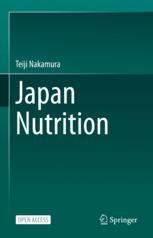Japan’s Unique Approach to Nutrition
The current Japanese diet is widely known as nutritionally excellent and healthy and is the driving force behind maintaining the world's best health and longest life expectancy. Could it be a blueprint for eradicating malnutrition globally? We discuss with Professor Teiji Nakamura, author of the open access book Japan Nutrition.
In this series of interviews, we talked to book authors and editors about how publishing open access has extended their impact and reach, something that is especially important to topics related to the UN Sustainable Development Goals (SDGs).
Could you share a short introduction to your OA book? What were you hoping to achieve?

My book Japan Nutrition summarizes the history of nutritional improvement in Japan while providing a scientific explanation of it, since the introduction of nutrition sciences to the country nearly 150 years ago. The current Japanese diet is widely known as nutritionally excellent and healthy. It is the driving force behind maintaining the world's best health and longest life expectancy. However, Japan's longevity has been brought about after the world war and is a result of continuous efforts by nutritionists and dietitians to improve nutrition in society based on nutrition science. Japan's unique approach to nutrition, or Japan Nutrition, contains three key points. It includes the implementation of nutrition policy, efforts to put the national policy into practice by introducing various training programs and placing nutrition specialists who are almost dietitians across multiple government agencies, schools, hospitals, companies, etc., as well as technological improvement of agriculture and modernization of the food industry. Improving nutrition in Japan was a big comprehensive project tackled through the industry-government-academia collaboration that has been called for in recent years.
Recently, experts worldwide have begun to argue that eradicating malnutrition is the foundation for achieving the SDG goals. Eradicating malnutrition means overcoming the double burden of it, that is thinness and obesity; by helping those who suffer from hunger and malnutrition and people living with obesity and suffer from non-communicable diseases. Many countries and international organizations have established nutrition improvement plans and targets, and nutrition is now the focus of more attention than ever before. However, the results have not been as good as expected; the Corona disaster and Ukraine crisis have worsened the situation. To break through this situation, I thought it was necessary to transmit Japan's nutrition to the world as a successful experience overcoming this problem. I wrote this book because I believe it is essential for people suffering from malnutrition to have a scientific explanation of this point.
Why did you choose to make your book available on an open access basis?
Solving nutritional problems requires knowledge and skills from nutritional science and various other disciplines such as agriculture, medicine, home economics, political science, sociology, and environmental studies. In addition, the participation of many people, including experts, professionals, politicians, and volunteers, is necessary to realize the solutions. Therefore, I decided to make this book freely accessible to many people. I hope this book will become a must-read for students, especially those planning to study nutrition.
How were you hoping that open access would help achieve your goals?
International organizations, nations, NGOs, and well-meaning companies and individuals are providing international assistance to eradicate malnutrition. However, such support is mainly food and economic aid. It does not continue and develops into a movement for improved nutrition that aims to enable the country's people to live healthy and happy lives. This book describes how Japan, which suffered from the same hunger as Asia and Africa today, created the world's healthiest diet by succeeding in sustainable nutritional improvement. I hope that nutrition professionals worldwide will read it.
What benefits or impact have you seen from publishing this book open access?
It has been of great benefit to me to be able to communicate the history, characteristics and significance of ”Japan Nutrition”, as well as my arguments, to a large number of people around the world. People involved in international nutritional issues have started to hear the term 'Japan Nutrition', and there is talk of international symposia and seminars being planned in the future. For example, the 8th Asian Congress of Dietetics 2022 was held in Yokohama in August 2022.
This translation of your Japanese book is the first publication at Springer Nature that was auto-translated from Japanese to English. How would you describe your experience with SN Translator, which is based on the DeepL-API?
The Japanese manuscript was first auto-translated and later revised by the author and further checked by a native linguist. This process was less burdensome and more convenient than writing the text in English from the beginning. Since this book had social, cultural, and psychological language and concepts, the native linguist pointed out some parts that needed revision, which I felt were the limitations of the auto-translation. For purely natural science manuscripts, author checks alone might have sufficed.
Take a closer look at Japan Nutrition. We also invite you to visit our SDG OA Book campaign page, as well as our hubs for SDG 2 ’Zero Hunger’ and SDG 3 ‘Good Health & Wellbeing’.
About the author
Professor Teiji Nakamura, President, Kanagawa University of Human Services; President, Japan Dietetic Association; President, Japanese Association of Nutritional Science Education.
Teiji Nakamura is author of the open access book Japan Nutrition.


